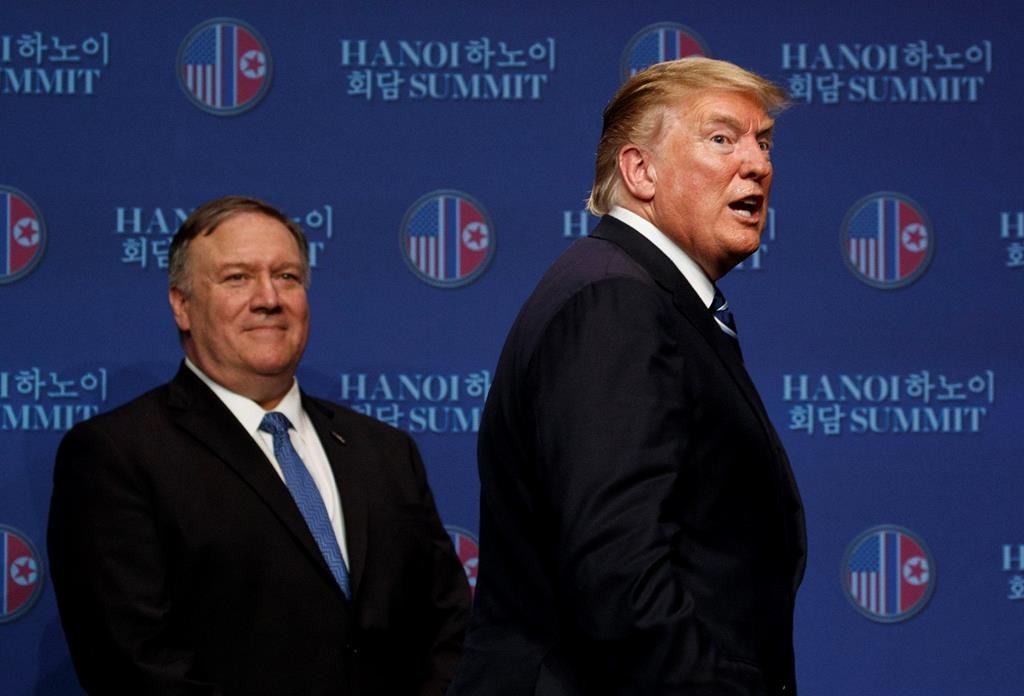U.S. President Donald Trump is expected to pull his country out of the Open Skies treaty, an agreement that allows member states to fly unarmed over each other’s territory for surveillance purposes.

The U.S.’s potential withdrawal from the treaty has many ringing alarm bells, especially Democrats, who have said the move would be “yet another gift” from the Trump administration to Russian President Vladimir Putin.
What is the Open Skies treaty, and why does it matter if the U.S. withdraws?
Here’s a look at what’s happening:
What is the Open Skies treaty, and who are its members?
The Open Skies treaty was signed in 1992 and went into effect in 2002.
There are 34 states who have ratified the treaty, most notably the U.S., Ukraine, Russia and Canada.
The treaty allows each party to fly over the entire territory of other members unarmed and on short notice.
The purpose of the multilateral agreement is surveillance and arms control.
According to the treaty, it allows nations to collect information on each other’s military forces and on “activities of concern” to further develop and strengthen peace, stability and “co-operative security.”
In an interview with Business Insider, Daryl Kimball, executive director of the Arms Control Association, said the treaty has been beneficial to the U.S., its allies and Russia.
“The treaty provides information about Russian military activities for the U.S. and allies in Europe,” Kimball told Business Insider. “And it also provides the Russians with some insight about some of our capabilities. And that transparency reduces uncertainty and the risk of conflict due to worst-case assumptions.”
He says the flights are not a “spying operation” but are “observational.”
“It is a form of monitoring and verification about the military activities and facilities on each side,” he said.
A ‘lack of coherent strategic thinking’
In a letter to U.S. Secretary of State Mike Pompeo and Secretary of Defence Mark Esper on Monday, four top Democrats involved in national security harshly criticized the potential withdrawal, calling it a “troubling reversal and a lack of coherent strategic thinking.”
The letter was signed by chairman of the House foreign affairs committee Eliot Engel, ranking member of the Senate foreign relations committee Robert Menendez, chairman of the House armed services committee Adam Smith and ranking member of the Senate armed services committee Jack Reed.
“The Open Skies treaty is a critical element of U.S. and European security, and a decision to withdraw would be another blow to regional stability as well as Ukrainian security,” they wrote.

The letter’s authors say the Trump administration has “no justification” for withdrawal on national security grounds and that there has been no consultation with Congress or U.S. allies.
“If the president withdraws from this landmark treaty, it will fundamentally demean and devalue the United States commitment to treaties and other international obligations,” the letter reads.
The authors urge the administration not to withdraw from the treaty and, “at minimum,” engage in “meaningful” consultation with Congress.
In a similar letter to national security adviser Robert O’Brien, Engel said American withdrawal would “only benefit Russia” and would be harmful to U.S. allies’ and partners’ national security interests.
He warned that U.S. relations with Russia have become “more acrimonious and complicated” over the last decade and that “dialogue and interaction” with Russia is important in this time of “heightened tension and increased potential for miscalculation.”
“The United States should prepare for the challenge that Russia presents — not abandon mechanisms that provide the United States with an important tool in maintaining surveillance on Russia,” he wrote.
What has the White House said?
The White House has not yet confirmed whether it plans to withdraw the U.S. from the treaty.
According to a CNN report, a White House spokesperson said U.S. officials will “continue to implement the treaty and are in full compliance with our obligations under this treaty, unlike Russia.”

However, some experts and administration officials believe the treaty has outlived its usefulness, partly because of alleged violations by Moscow.
These include restrictions Moscow imposed on certain observation flights over Kaliningrad, a Russian enclave on the Baltic Sea sandwiched between Poland and Lithuania, and flights near the disputed border between Russia and Georgia.
A former Trump administration official, speaking on condition of anonymity, told Reuters the treaty was outdated because the U.S. can share satellite imagery that is not overly sensitive with other countries.
The former official also told Reuters that countries now have access to high-quality commercial satellite photographs.
“We can share satellite overhead depending on how sensitive it is,” the former official said. “A lot of this you can get from commercial satellites, too.”
What has Russia said?
On Tuesday, the Russian Embassy in the U.S. tweeted expressing its support for the Open Skies treaty.
“We consider the #OpenSkiesTreaty to be an important instrument in ensuring European security on the same level as the 2011 Vienna document on confidence- and security-building measures,” the tweet reads.
Global News sent a request for comment to Global Affairs Canada, but did not hear back by time of publication.
— With files from Reuters




Comments